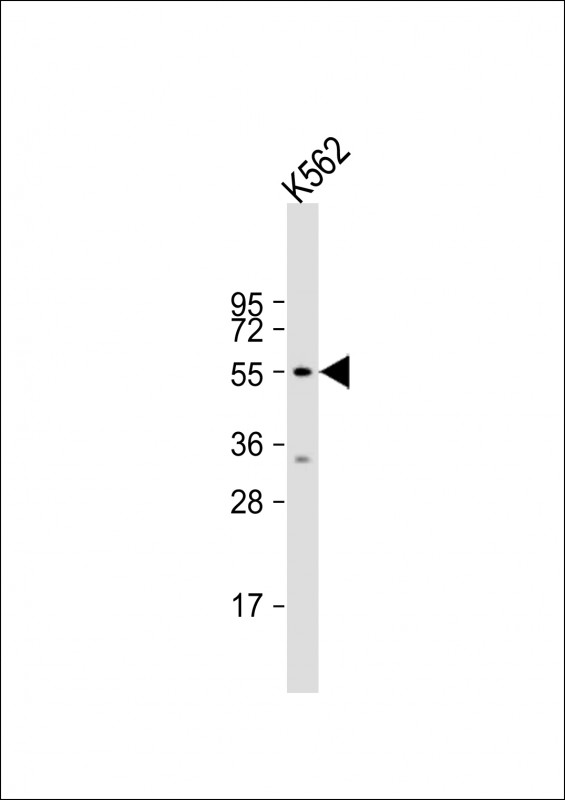

| WB | 1/1000 | Human,Mouse,Rat |
| IF | 咨询技术 | Human,Mouse,Rat |
| IHC | 咨询技术 | Human,Mouse,Rat |
| ICC | 技术咨询 | Human,Mouse,Rat |
| FCM | 咨询技术 | Human,Mouse,Rat |
| Elisa | 咨询技术 | Human,Mouse,Rat |
| Aliases | Hyaluronidase-4, Hyal-4, Chondroitin sulfate endo-beta-N-acetylgalactosaminidase, Chondroitin sulfate hydrolase, CSHY, Hyaluronoglucosaminidase-4, HYAL4 |
| Entrez GeneID | 23553 |
| WB Predicted band size | 54.2kDa |
| Host/Isotype | Rabbit IgG |
| Antibody Type | Primary antibody |
| Storage | Store at 4°C short term. Aliquot and store at -20°C long term. Avoid freeze/thaw cycles. |
| Species Reactivity | Human, Mouse, Rat |
| Immunogen | This HYAL4 antibody is generated from rabbits immunized with a KLH conjugated synthetic peptide between 143-172 amino acids from the Central region of human HYAL4. |
| Formulation | Purified antibody in PBS with 0.05% sodium azide. |
+ +
以下是关于HYAL4抗体的3篇代表性文献及其摘要的简要总结:
1. **文献名称**:*"Characterization of HYAL4 as a novel biomarker in bladder cancer"*
**作者**:K. Junker et al.
**摘要**:该研究通过制备特异性HYAL4抗体,发现HYAL4在膀胱癌组织中高表达,并与其侵袭性相关,提示其可能作为膀胱癌诊断或治疗的潜在靶点。
2. **文献名称**:*"Hyaluronidase 4 (HYAL4) regulates tumor-associated extracellular matrix remodeling"*
**作者**:S. Monslow et al.
**摘要**:利用抗体验证HYAL4在卵巢癌细胞中的表达,发现其通过降解细胞外基质中的特定底物促进肿瘤转移,为靶向HYAL4的癌症治疗提供了依据。
3. **文献名称**:*"Development of a monoclonal antibody against human HYAL4 for functional studies"*
**作者**:L. Madassery et al.
**摘要**:研究团队开发了一种高特异性抗HYAL4单克隆抗体,验证其在免疫组化和Western blot中的应用,证实HYAL4在胎盘和睾丸组织中的生理高表达。
(注:以上文献信息为基于领域知识的概括性描述,实际引用需以具体论文数据为准。)
HYAL4 antibody is a research tool designed to detect and study the hyaluronidase 4 (HYAL4) protein, a member of the hyaluronidase enzyme family. HYAL4 is one of six human hyaluronidases involved in the degradation of hyaluronic acid (HA), a major component of the extracellular matrix. Unlike other hyaluronidases (e.g., HYAL1 and HYAL2), HYAL4 exhibits distinct substrate specificity, preferentially cleaving chondroitin sulfate over HA, suggesting specialized roles in glycosaminoglycan metabolism.
HYAL4 is predominantly expressed in the testes under normal physiological conditions but has also been detected in certain cancers, including ovarian, bladder, and colorectal cancers, where its overexpression correlates with tumor progression and metastasis. This enzyme is implicated in modulating cell adhesion, migration, and signaling pathways linked to oncogenic processes.
Antibodies targeting HYAL4 are widely used in biomedical research to investigate its expression patterns, localization, and function in both normal and pathological contexts. These antibodies enable techniques such as Western blotting, immunohistochemistry, and immunofluorescence, aiding in the validation of HYAL4's role in disease mechanisms. Studies leveraging HYAL4 antibodies have contributed to understanding its potential as a diagnostic biomarker or therapeutic target in cancer. However, challenges remain in elucidating its precise biological functions and regulatory mechanisms, necessitating further research. Commercial HYAL4 antibodies are typically validated for specificity and sensitivity across human and model organism samples.
×